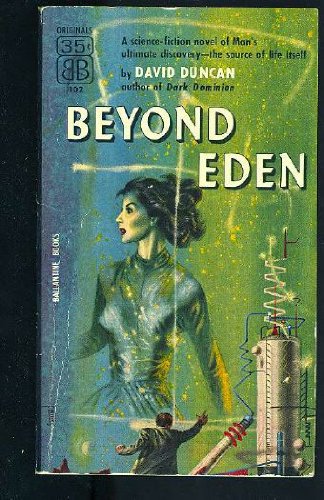- Date: 18.03.2009
- Book: Beyond Eden
- Author: plappen
Review
Beyond Eden, David Duncan, Ballantine Books, 1955The Neptune Authority, headquartered in California's Imperial Valley, is about to radically transform American society, and then all of mankind. A safe and reliable way has been found to remove all of the impurities from regular salt water, and then use that clean water to irrigate the deserts in western America, from California to Texas to Utah. Just before the system is turned on, there is a problem.
Something in the water causes the one-celled creatures in the water, like bacteria and protozoa, to grow and multiply much faster than normal. All known chemical and biological tests show nothing. It can only be sen in its effects on other creatures. Some of the local agricultural workers have been drinking the water, and reports surface that it amplifies their natural human tendencies, toward good or evil, pessimism or optimism.
During a Senate inspection tour, Senator Cumberland, an elderly man, drinks the water, and then dies of a heart attack. At the same time, Senator Bannerman, an enemy of the project, drinks the water, and is convinced that he has been poisoned. After recovering in the hospital, he, and several colleagues, return to California for a full-fledged Congressional hearing. All that Bannerman cares about is proving that he has uncovered this monstrous plot to rid the world of "undesirables."
Finally, the scientists are able to isolate it (they call it Spectralium), though they still don't know just what it is. At a dramatic moment in the hearing, Madeline Angus, one of the technicians who helped isolate Spectralium, and Senator Bannerman, each drink a highly concentrated glass of it, with different results (No, the Senator does not turn into a hideous monster).
This is a very good novel about mankind's future. There are echoes of Arthur C. Clarke's "Childhood's End"; if you can find a copy, it's worth reading.
Recent actions
-
toryah1988 has added Harry Potter And The Order Of The Phoenix to their read list.
-
toryah1988 has added Harry Potter And The Goblet Of Fire to their read list.
-
toryah1988 has added Atonement to their read list.
-
toryah1988 has added New Moon (The Twilight Saga) to their read list.
-
Monica has added The Da Vinci Code (Large Print) to their wish list.
